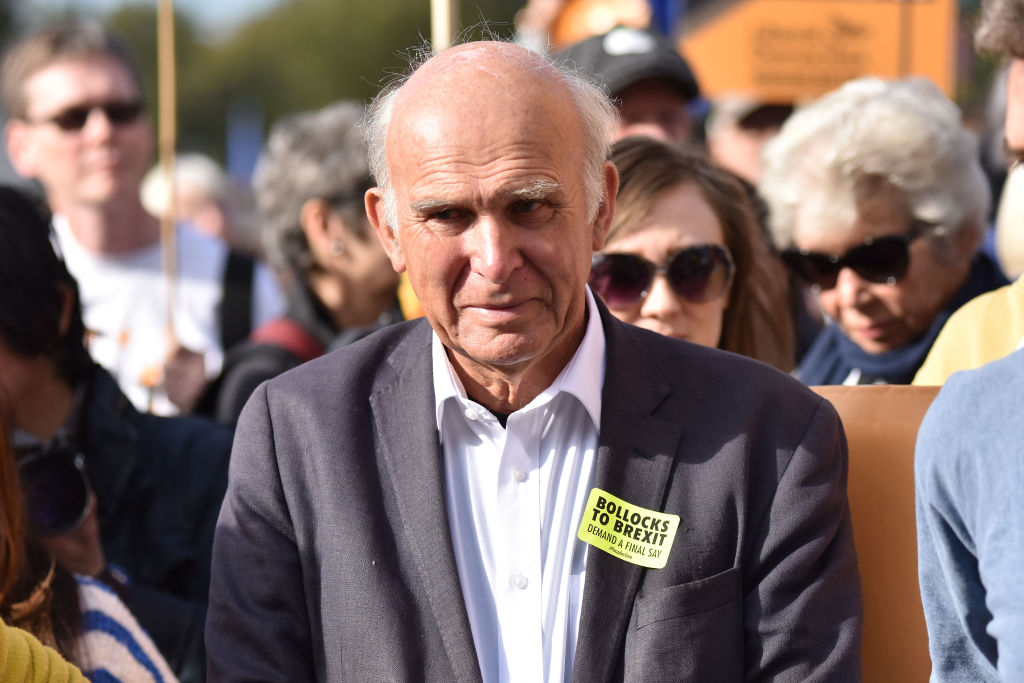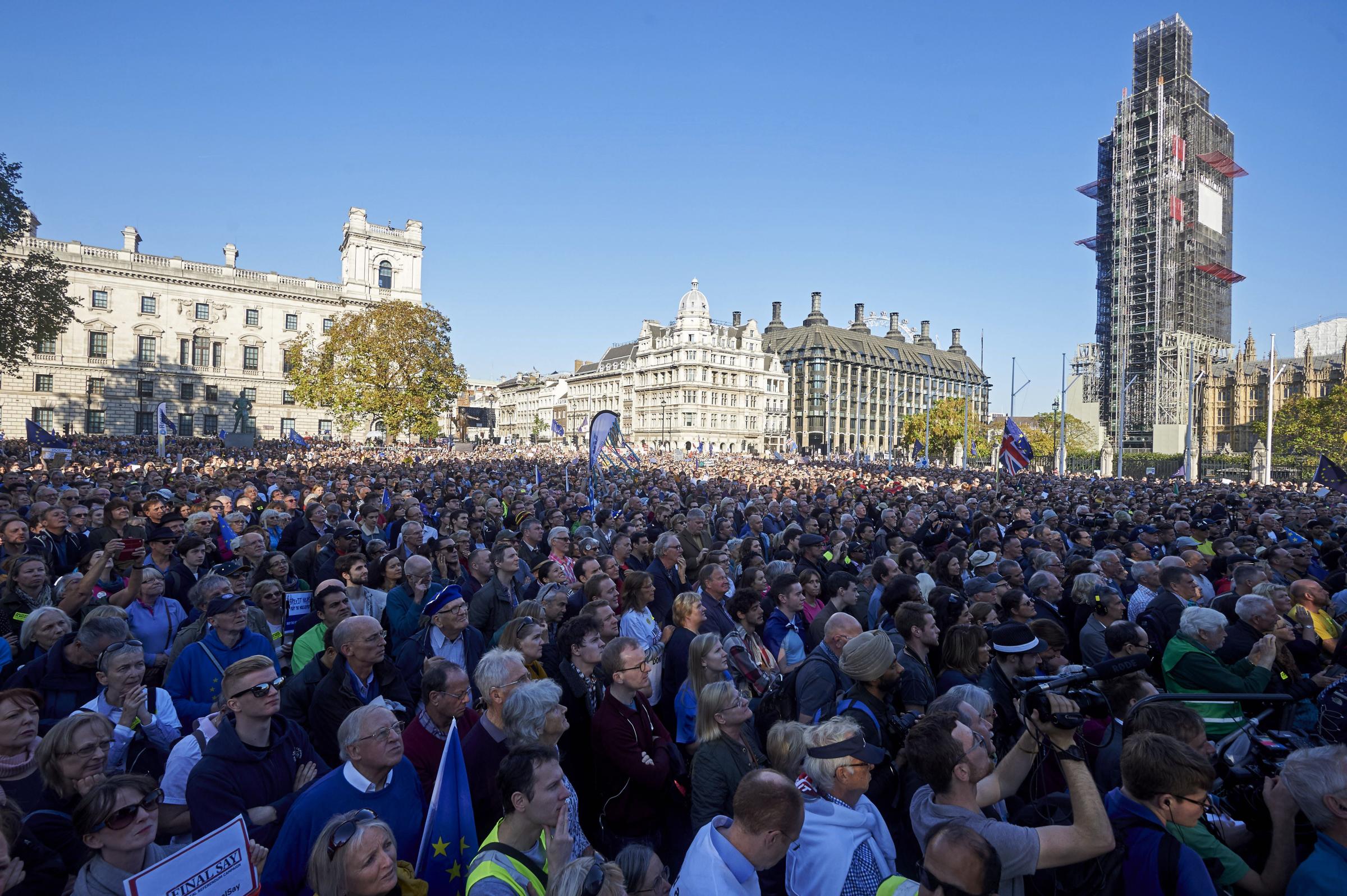
London has a reputation for bad weather, but on Oct. 20 at about midday, the sky was a perfect blue. That was good news for Vince Cable, the leader of the U.K.’s centrist Liberal Democrats party. Buoyed by the lack of rain, he and roughly 700,000 others marched on the Houses of Parliament to call for a “People’s Vote,” or second referendum, on Britain’s withdrawal from the European Union.
“We’re all here,” Cable told the assembled marchers, “because we can see that Brexit is a potential disaster and because we believe it can be stopped.” Although he spoke alongside politicians like London Mayor Sadiq Khan and Green Party former leader Caroline Lucas, it was his line that drew some of the wildest cheers: “It’s not inevitable.”
Cable, 75, is an unlikely revolutionary. Between 2010 and 2015, he was a high-ranking minister for the “Lib Dems” — for years, the UK’s third largest party — in a coalition government with the Conservative party. One of his colleagues back then became the prime minister, Theresa May, whose ongoing efforts to negotiate a deal in the E.U. capital of Brussels he is now trying to unravel.
May’s progress has been fraught. A snap election in June 2017 was meant to strengthen her position but returned her a reduced parliamentary majority, which has made it even harder to satisfy all parties. Senior cabinet resignations and fears of what a failure to secure a deal would mean for the country have bred an anxious mood. In April this year, in response, a number of lawmakers from across the political spectrum established the campaign for a People’s Vote on whether or not to accept the Brexit deal. Support grew over the summer, and the Oct. 20 march was its greatest show of strength so far.
A week and a half on from the march, Cable is sitting in his Westminster office looking out on a significantly colder and wetter vista. Just like the London weather, he believes there has been a profound shift in the outlook of the U.K. voting public on Brexit since the referendum, when 52% of the electorate voted for Britain to leave the E.U. “There is a general sense that the government has made a mess of the negotiation,” he tells TIME. “Brexit is not remotely like what we were told at the time.”
The solution Cable supports is another referendum, a national vote on the final terms of Britain’s exit in which the electorate could choose to take whatever deal May brings back to London, or remain within the E.U. — effectively halting Brexit forever. “It seems to me to be absolutely right that the public are given a choice whether they want to accept what’s been negotiated on their behalf, or to remain within the E.U,” he says.

Before the October march, such views were dismissed as fringe. To some extent, they still are. Both the ruling Conservative Party and the main opposition Labour Party have accepted Brexit as “the will of the people” and have committed to seeing it through.
And despite having been a key player in the government until 2015, Cable’s party is now a diminished force. It has only a dozen lawmakers in Britain’s parliament of 650, down from 57 when they were in government, and has slipped from third largest party to fourth, after the Scottish National Party. When Brexit came along, they saw their chance to rebrand themselves as the only major anti-Brexit party in Britain.
“Critics of the People’s Vote campaign thought there would be a token march with a few thousand people,” Cable says of the recent 700,000-strong protest. “But it was on a scale that far surpassed any realistic expectations.” That, he thinks, reflects a broader change in Britain — one that could simultaneously reverse Brexit and sweep the Liberal Democrats to relevance once again. It might sound like wishful thinking, but Cable is confident. “It’s very clear that there has been a change in the mood,” he says.
He is borne out by the polls, but only just. Recent surveys by YouGov show the public is still deeply divided on whether the U.K. was right or wrong to vote to leave in 2016. However, that balance has shifted from a slight majority for “right” just after the referendum to a consistent 3% lead for “wrong” in 2018. In July, a greater proportion of people polled (42%) said they believed there should be a second referendum than those (40%) who thought there should not — the first time the balance has tipped since the vote.
Cable’s Liberal Democrats may see good fortune ahead by aligning themselves with the People’s Vote project, but they are also driven by staunch liberal convictions, as their opponents love to point out. Cable doesn’t necessarily hide that. “It’s very difficult to see how Brexit can have a positive impact on Britain’s role in the world,” he says. “Britain was seen as a progressive force and it was influencing the whole of Europe, and we’ve lost that or will be losing it.”
As the U.K.’s traditional centrist party, the Lib Dems have always struggled to stake out their own ground independent of their larger, domineering neighbors to the left and right. But, in the U.K. and across the world, Cable says the polarization of politics just might eventually allow centrist parties to thrive. “Brexit is one manifestation of this populist movement which is very damaging to international cooperation,” he says. “It’s certainly true that moderate, liberal social democratic parties have been under pressure in recent years but it’s very far from a simple story.”
President Emmanuel Macron in France and prime minister Justin Trudeau in Canada, he points out, are both moderates who have both benefited from the new hyperconnected political environment of the late 2010s. “The successful movements,” he says, “have realized they’ve got to adapt their way of communicating to the electorate.”
Trudeau’s Canadian Liberals, in particular, are an example he’s keen to emulate, and he confirms to TIME that the two parties have been cooperating. “What captured our attention was the fact they came from third to first,” Cable says, of the Canadian party’s re-emergence after being nearly wiped out at the polls in 2011. “They were written off as a failed liberal party, and actually they defeated and confounded all their critics.”
Their secret weapon, Cable says, was turning their party into a mass movement as well as a formal political party, with fewer barriers to entry. He can only hope the People’s Vote campaign provides an opportunity for the Lib Dems to do the same.
More Must-Reads From TIME
- The 100 Most Influential People of 2024
- Coco Gauff Is Playing for Herself Now
- Scenes From Pro-Palestinian Encampments Across U.S. Universities
- 6 Compliments That Land Every Time
- If You're Dating Right Now , You're Brave: Column
- The AI That Could Heal a Divided Internet
- Fallout Is a Brilliant Model for the Future of Video Game Adaptations
- Want Weekly Recs on What to Watch, Read, and More? Sign Up for Worth Your Time
Write to Billy Perrigo/London at billy.perrigo@time.com